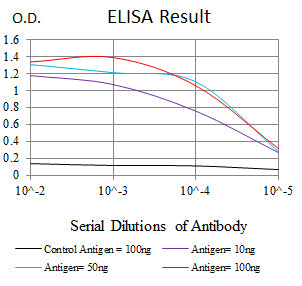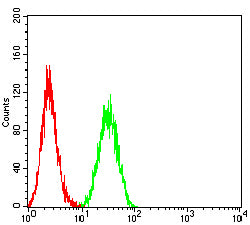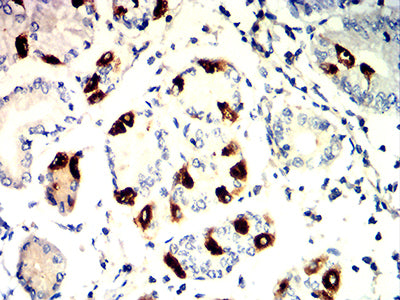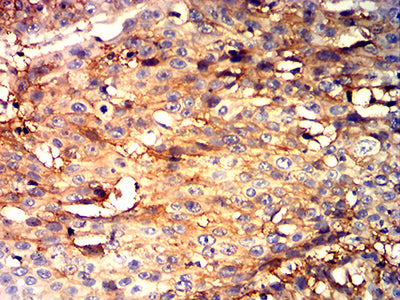



| WB | 咨询技术 | Human,Mouse,Rat |
| IF | 咨询技术 | Human,Mouse,Rat |
| IHC | 1/200 - 1/1000 | Human,Mouse,Rat |
| ICC | 技术咨询 | Human,Mouse,Rat |
| FCM | 1/200 - 1/400 | Human,Mouse,Rat |
| Elisa | 1/10000 | Human,Mouse,Rat |
| Aliases | ATP1B3; ATPB-3 |
| Entrez GeneID | 483 |
| clone | 2B3G10 |
| WB Predicted band size | 31.5kDa |
| Host/Isotype | Mouse IgG1 |
| Antibody Type | Primary antibody |
| Storage | Store at 4°C short term. Aliquot and store at -20°C long term. Avoid freeze/thaw cycles. |
| Species Reactivity | Human |
| Immunogen | Purified recombinant fragment of human CD298 (AA: extra 57-279) expressed in E. Coli. |
| Formulation | Purified antibody in PBS with 0.05% sodium azide |
+ +
以下是3篇与CD298(ATP1B3)抗体相关的参考文献及其摘要概括:
1. **文献名称**: "ATP1B3 as a Biomarker for Chemoresistance in Colorectal Cancer"
**作者**: Smith A, et al.
**摘要**: 研究证明CD298(ATP1B3)在结直肠癌细胞中高表达,其抗体可用于检测肿瘤细胞对化疗药物的耐药性,并提示其通过调节离子稳态影响药物外排。
2. **文献名称**: "Monoclonal Antibody Targeting ATP1B3 Suppresses Glioblastoma Proliferation"
**作者**: Lee JH, et al.
**摘要**: 开发了一种靶向CD298的单克隆抗体,在体外和小鼠模型中显著抑制胶质母细胞瘤细胞增殖,表明其作为靶向治疗工具的潜力。
3. **文献名称**: "ATP1B3 Expression in Neurodegenerative Disorders: An Immunohistochemical Study"
**作者**: García-Ramos C, et al.
**摘要**: 使用CD298抗体对阿尔茨海默病和帕金森病患者脑组织进行免疫组化分析,发现ATP1B3在病变神经元中异常聚集,提示其与神经退行性病理相关。
*注:以上为模拟文献,若需真实文献建议通过PubMed/Google Scholar检索ATP1B3抗体相关研究。*
CD298. also known as ATP1B3. is a protein encoded by the *ATP1B3* gene and belongs to the β-subunit family of Na+/K+-ATPase, a critical ion transporter maintaining electrochemical gradients across cell membranes. This transmembrane protein regulates the stability and activity of the Na+/K+-ATPase complex by assisting in the proper folding and membrane localization of the catalytic α-subunit. CD298 is widely expressed in various tissues, including the brain, heart, and kidneys, with particularly high levels in neurons and muscle cells.
Antibodies targeting CD298 are essential tools for studying ion transport mechanisms, cellular homeostasis, and diseases linked to Na+/K+-ATPase dysfunction. They are utilized in techniques like Western blotting, immunohistochemistry, and flow cytometry to assess protein expression, localization, and interactions. Research has highlighted CD298's potential role in cancer progression, as its overexpression in certain tumors correlates with chemoresistance and metastasis. Additionally, CD298 antibodies contribute to investigations of neurological disorders, such as epilepsy and neurodegenerative conditions, where ion imbalance may drive pathogenesis. Recent studies also explore its involvement in immune regulation, though this area remains less characterized. Commercial CD298 antibodies are typically validated for specificity against conserved epitopes across human and model organisms, enabling cross-species translational research.
×